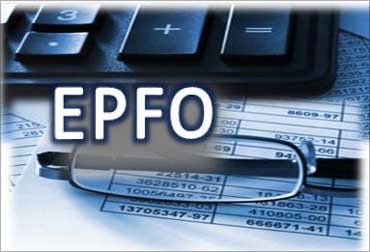Photographs: Rediff Archives Ramya Ramachandran, Investmentyogi
Every month your salary slip features a deduction towards your Provident Fund (also known as Employees Provident Fund or EPF in short). How often have you wondered if such a contribution is actually beneficial to you and if it is actually needed? What if you quit or switch over jobs? Here's explaining the benefits EPF carries and why one should pay attention to this contribution.
1. The statutory requirement
The EPF is maintained solely by the Employees' Provident Fund Organisation of India. As a statutory rule, any company having more than 20 employees, have to register with the EPFO.
Benefits of Employees' Provident Fund explained
2. Contribution to EPF
Employees' contribution to the EPF comprises of 12 per cent of the Basic + DA + the cash value of food allowances.
An equal amount of 12 per cent is contributed by the employer too, to the fund. Some organisations offer a variant to the traditional EPF, known as the Voluntary Provident Fund (VPF), wherein a voluntary contribution to PF over and above the mandate 12 per cent could be made.
In such a case, the employer is not mandated to match this level and may contribute only up to the maximum amount of 12 per cent.
Benefits of Employees' Provident Fund explained
3. Is contribution to the EPF mandatory?
Well, for those who have a basic salary of up to Rs 6,500, contributing to the EPF is mandatory. Contributions are voluntary for those whose basic salary exceeds Rs 6,500. However it is strongly recommended to make such contributions to avail of the various benefits an EPF has in store.
Benefits of Employees' Provident Fund explained
4. Why should you contribute to the EPF?
The contributions to the EPF come with a lot of benefits. Here is a peek into what it has in store, and why one should seldom ignore it.
a) Safety of returns
The EPF is the safest debt instrument to invest in. Backed by the government, it guarantees safety of principal as well as the interest earned, making it suitable for long term financial goals. It also brings about an automatic discipline in investing.
b) Loan options on EPF
Most companies offer you a loan against EPF as a security at reasonable rates of interest. So the higher your PF balance, the more is your eligibility for such loans. In times of a crisis, if you so require some money, your EPF could come to your rescue.
Benefits of Employees' Provident Fund explained
c) Tax treatment on EPF
The contributions you make towards your provident fund gets you a tax benefit under section 80C, up to a maximum limit of Rs 1,00,000. Also, the maturity proceeds are tax free, if contributions to the fund have been for more than five years.
d) Interest earned on EPF
The rate of interest earned on a PF account is fixed every year during the months of March or April by the Government. The EPF currently for the financial year 2010-2011 carries an interest rate of 9.5 per cent. This interest rate is guaranteed and risk-free.
e) Withdrawal facility in EPF
The complete amount from your PF could be withdrawn on Retirement at the age of 55 years or due to early retirement on account of some disability etc. Partial withdrawal of money from the fund is permitted occasionally to meet expenses of marriage, medical costs or for building or purchase of a home.
Benefits of Employees' Provident Fund explained
For other cases such as:
5. Shifting of jobs
At such times, the PF balance could be transferred from one employer to another. The existing balance would continue to stay. With fresh contributions made by the new employer.
6. Quitting of job
PF could be withdrawn, if you quit your job and provide a declaration that you do not intend to work for the next six month.
Benefits of Employees' Provident Fund explained
The EPF is a perfect tool to build a substantial retirement corpus for investors.
It works on the basic principal of compounding, giving a high effective net yield on your investment. Compounding is the system where the interest earned on the principal is accumulated back into the investment to give more earnings.
The more the number of times compounding takes place, more the growth in money. The prudence thus lies in letting you EPF investment grow so that it serves as a perfect social security and monetary support on retirement to lead a comfortable life ahead.









Comment
article